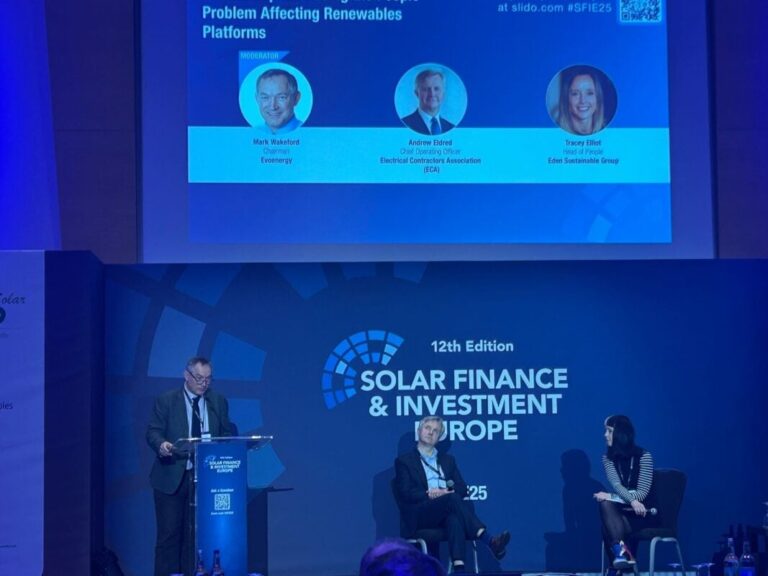The Green Skills Gap is “both manageable and active involvement”, according to a panel of market leaders.
On the last day of Solar Media’s Solar Finance & Investment Europe 2025 Conference, CEO of EvoEnergy Mark Wakeford noted that the VK expects a triple increase in the solar capacity compared to this government, something for which around 60,000 new people are needed within To arrive in the industry.
Tracey Elliot, head of people from Solar Firm Sustainable Group on the roof, emphasized industry to build skills in the workforce and says: “The government really pushes us like an industry to work on this problem”.
However, a considerable number of people is simply not aware of green skills or the career opportunities in the sector. According to a recent report from the Learning and Work Institute, 87% of young people between the ages of 16-24 have no idea about green skills, to which Elliot noted: “We have to go to schools and tell young people that there is a really beautiful future in renewable energy sources ”.
Moreover, some data used for calculating the demand for green tasks are not as useful as it could be. According to Andrew Eldred, Chief Operating Officer at Trade Group The Electrical Contractors Association, much of the data used to calculate the number of green tasks that are currently not filled, originating from online skill signs such as LinkedIn, but many small companies use this kind Not sites, which Eldred notes that the data “significantly” shakes “.
Eldred spoke with our sister publication PV Tech About these challenges earlier this year, added today that he believes that the skill system is “suboptimal”, in which students are not financed properly, and financing that does not help to learn to learn further education instead of students Instead of students, including more practical training.
He said: “The industry does not have the right level of input and influence on the skills system as it should have – the Ministry of Education must listen more to us to increase green skills.”
According to Elliot, setting qualifying standards is an important question for the industry. She stated: “As far as qualifications are concerned, that is the challenge for the industry – we do not have standard routes according to competence. That is what we have to do first, and then we have to go to colleges and universities to tell them what we need ”.
Eldred agreed and added that it makes no sense to “get a qualification from thin air” and that the UK must ensure that it uses international skills and industry input to develop a standard.
Moreover, the time pressure of carbon base means that educational providers may have to be flexible and work to adjust the currently available training standards to quickly increase staff. Elliot said: “The challenge is to make a new solar-specific internship, takes too long before 2030 goals. As a result, we had to adjust an existing internship. “She adds:” The challenge in our industry is that we are against the clock – we now have to be low in low -carbon. “
Young people, dei and the role of developers
On the subject of getting more young people in the industry, Eldred stated: “I think the best we can do is really buy in the idea that there is a problem with skills, and that projects and developers play a role in Repairing it “. He suggested that the idea of an” old social clause “must be brought back to Vogue, with minimal levels of personnel hours made by students and employees of work experience, to force developers to stimulate industry.
Diversity, equity and inclusion (dei) remains a problem. Elliot notes that she tries ‘positive’ to actively recruit female project managers and other staff, but has found the ‘extremely difficult’, adding that more must be done to recruit more graduates from the female university in the solar industry . “We know that we work better if we are more diverse – we must be attractive for a more diverse range of people”.
Wakeford concluded the panel by noting that, despite the challenges, he is “extreme trust” that the UK will solve the problem of skills with experts such as the recommended panel members, as well as the cooperation of the broader industry.


